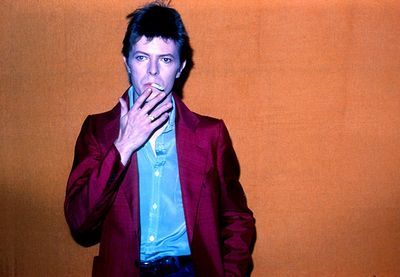David Bowie ��� that particular circular mix

Photo by Barry Schultz / Sunshine / REX / Shutterstock
By ROZ DINEEN
Of all the artists to have been written about in the TLS David Bowie, who died on Sunday evening, is surely among the most vibrant and unpredictable; occupying that fertile artistic ground where vulnerability and certainty of vision combine.
���Through it all���, Wesley Stace wrote in the TLS in 2011, ���Bowie has remained an excellent and adventurous songwriter, something that often goes unmentioned. In his early years, not everyone fell for the guitar-strumming folkie singing Jacques Brel songs in funny clothes, but, as Bowie found his voice, and his lyrics, that particular circular mix of decadence and pending apocalypse, an apocalypse that seemed to excuse and demand further decadence (because if the world is doomed, we might as well have a party), his songs became ever more clearly the work of a master singer-songwriter. And even though the masks allowed Bowie a certain aloofness from the grimy world of rock, as he fashioned himself into the multi-media artist he had always claimed to be, he compared his songs to ���talking to a psychoanalyst. My act is my couch���. The further he strays away from this ruthless self-analysis, however opaque the images, the less successful his work and it is at those moments, when inspiration is lacking, that he has sometimes chosen to disguise the fact with noise.���
���Like all great stars���, Pat Kane observed in 1997, ���Bowie has been a showman of his selves; and where the empty core behind the display has driven contemporaries to either madness or blandness, Bowie has used his fractured identity as a spin of the dice, an openness to the next cultural turn. The ���coldness��� remarked upon by so many . . . is probably the cost of this opportunistic fluidity; a matter of ���loving the alien���, indeed.���
More recently, our deputy editor Alan Jenkins took to this blog to ask readers to "give five minutes of their time to Where Are We Now? ��� song-plus-video ��� and share in the elation I imagine all TLS readers must feel at the arrival of a masterpiece. It is a slow, very slow song, full of brought-low sadness and high drama, announcing itself from its first crashing piano chords as utterly, inimitably a Bowie song ��� and a 'big' one, perhaps a huge one, of the magnitude of Always Crashing in the Same Car, Heroes and Fantastic Voyage; and it is to the musical and emotional ambience ��� whirling synthesizers, echoey drums, throat-tightening melody, hair-raisingly exposed, yearning lyric ��� of Bowie���s great Berlin years, the years of Low, Heroes and Lodger, that this song explicitly, elegiacally returns . . . 'We could steal time', Bowie sang in 'Heroes'; the singer of 'Where Are We Now?' knows that time is stealing him, his friends, his life".
David Bowie's final song, "Lazarus", was released last week. In the music video Bowie sings from a hospital bed, a bandage around his head with buttons sown on for eyes. The song ends, "Oh I���ll be free / Just like that bluebird / Oh I���ll be free / Ain���t that just like me"; and the singer disappears, as if pulled back, into a dark wardrobe. It would appear that he even colluded in the presentation of his death.
Wesley Stace on "David Bowie, magpie and chameleon"
Pat Kane on "The Thin White Duke"
Peter Stothard's Blog
- Peter Stothard's profile
- 30 followers



